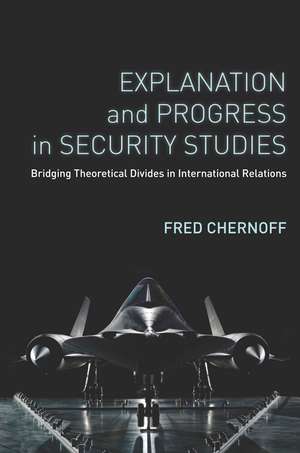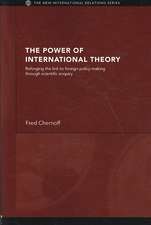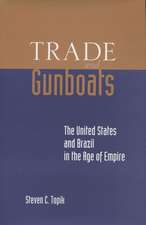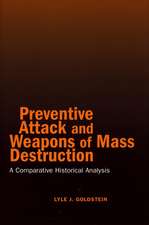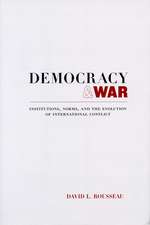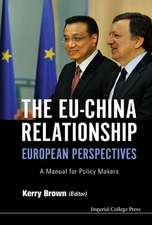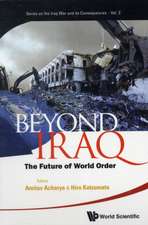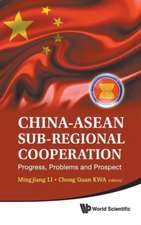Explanation and Progress in Security Studies: Bridging Theoretical Divides in International Relations
Autor Fred Chernoffen Limba Engleză Hardback – 19 aug 2014
Explanation and Progress in Security Studies asks why Security Studies, as a central area of International Relations, has not experienced scientific progress in the way natural sciences have—and answers by arguing that the underlying reason is that scholars in Security Studies have advanced a range of different notions of "explanation" or different criteria of "explanatory superiority" to show that their positions are better than rival positions.
To demonstrate this, the author engages in in-depth content analysis of the generally recognized exemplars of explanation and explanatory superiority in three of the core debates in the disciplines: Why do states pursue policies of nuclear proliferation? Why do states choose to form the alliances they do? And why do liberal democratic states behave the way they do toward other liberal democracies?
The book reveals that authors in the debates that have shown the most progress use similar criteria in arguing for and against the key explanations. In the nuclear proliferation debate, there is wide divergence in the criteria the most visible authors use, and there is wide divergence in the explanations offered. In the alliance formation/balance-of-power debate, there is some overlap of criteria the most important authors use, and there has been some limited movement toward consensus. In the democratic peace debate there has been much more overlap of criteria the most prominent authors use, and there is agreement on both some positive and negative conclusions.
To demonstrate this, the author engages in in-depth content analysis of the generally recognized exemplars of explanation and explanatory superiority in three of the core debates in the disciplines: Why do states pursue policies of nuclear proliferation? Why do states choose to form the alliances they do? And why do liberal democratic states behave the way they do toward other liberal democracies?
The book reveals that authors in the debates that have shown the most progress use similar criteria in arguing for and against the key explanations. In the nuclear proliferation debate, there is wide divergence in the criteria the most visible authors use, and there is wide divergence in the explanations offered. In the alliance formation/balance-of-power debate, there is some overlap of criteria the most important authors use, and there has been some limited movement toward consensus. In the democratic peace debate there has been much more overlap of criteria the most prominent authors use, and there is agreement on both some positive and negative conclusions.
| Toate formatele și edițiile | Preț | Express |
|---|---|---|
| Paperback (1) | 209.80 lei 3-5 săpt. | |
| Stanford University Press – 19 aug 2014 | 209.80 lei 3-5 săpt. | |
| Hardback (1) | 724.26 lei 6-8 săpt. | |
| Stanford University Press – 19 aug 2014 | 724.26 lei 6-8 săpt. |
Preț: 724.26 lei
Preț vechi: 940.60 lei
-23% Nou
Puncte Express: 1086
Preț estimativ în valută:
138.58€ • 145.08$ • 114.67£
138.58€ • 145.08$ • 114.67£
Carte tipărită la comandă
Livrare economică 05-19 aprilie
Preluare comenzi: 021 569.72.76
Specificații
ISBN-13: 9780804790956
ISBN-10: 0804790957
Pagini: 328
Dimensiuni: 152 x 229 x 23 mm
Greutate: 0.57 kg
Editura: Stanford University Press
Colecția Stanford Security Studies
ISBN-10: 0804790957
Pagini: 328
Dimensiuni: 152 x 229 x 23 mm
Greutate: 0.57 kg
Editura: Stanford University Press
Colecția Stanford Security Studies
Recenzii
"The main body of the book thoroughly examines three major debates in security studies: nuclear proliferation, alliance formation, and the democratic peace . . . As a theoretical and methodological work that looks inward at the field, this book will appeal primarily to academics in political science and international relations. Those readers, however, will value the comprehensive analysis of these major issues areas and the sophistication and accessibility of the book's overall findings . . . Summing Up: Recommended."—A. G. Reiter, CHOICE
"This is an extraordinarily important work that offers an original insight into why the social sciences in general, and the fields of international relations and security studies in particular, have failed to coalesce into a paradigm. It provides an informative addendum to Kuhn's seminal work, The Structure of Scientific Revolutions."—James J. Wirtz, Dean, School of International Graduate Studies, Naval Postgraduate School
"Why do theoretical debates in international relations get recycled rather than resolved? Why does the cumulation of evidence fail to generate scholarly consensus, as it does in the natural sciences? How can we enhance scientific progress in international relations? In this wide-ranging, sophisticated, and innovative study, Chernoff offers a persuasive answer to these critical questions."—Jack S. Levy, Board of Governors' Professor, Rutgers University
"Rigorous theory appraisal within IR is fairly rare; this book sets a new benchmark on how to evaluate research programs. It is the best book on progress within IR since the work of Elman and Elman. I highly recommend it for scholars and students alike."—John A. Vasquez, Thomas Mackie Scholar in International Relations, University of Illinois at Urbana-Champaign
Notă biografică
Fred Chernoff is the Harvey Picker Professor of International Relations at Colgate University.
